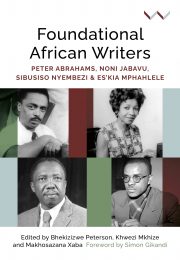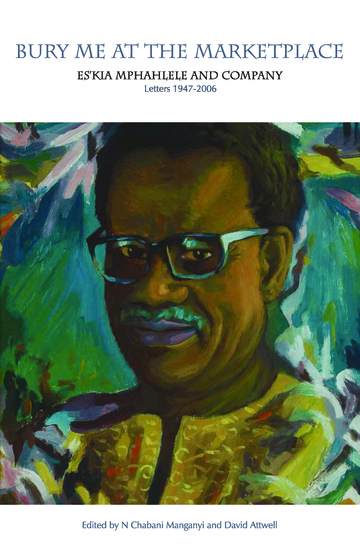Foundational African Writers
Peter Abrahams, Noni Jabavu, Sibusiso Nyembezi and Es’kia Mphahlele
Contributor(s): Andrea Thorpe, Anne-Maria Makhulu, Athambile Masola, Bhekizizwe Peterson, Christopher E. W. Ouma, Crain Soudien, Hugo Canham, Innocentia J. Mhlambi, James Ogude, Jill Bradbury, Khwezi Mkhize, Makhosazana Xaba, Obi Nwakanma, Sikhumbuzo Mngadi, Simon Gikandi, Stéphane Robolin, Thando Njovane, Thuto Thipe, Tina Steiner, Victoria J. Collis-Buthelezi
- Publication Date: June 2022
- Dimensions and Pages: 244 x 170mm Number of figures (B&W): 18 Extent: 448pp
- Paperback EAN: 978-1-77614-751-9
- eBook EAN: 978-1-77614-754-0
- PDF EAN: 978-1-77614-753-3
- Rights: World
- Recommended Price (ZAR): 395.00
- Recommended Price (USD): 35
This is an important and visionary project, assured of its own ethical and political worth, and the
work of years of collaboration across generations, regions and intellectual traditions; it maps
that which it also creates through the groundbreaking world-making of the research network.
— Carli Coetzee, Editor, Journal of African Cultural Studies
This well-crafted collection recovers the seminal position of four of the most important
twenty-first-century African writers who have been absent from the canon and recalibrates the
distinctive development of African literature.
—Mpalive Msiska, Associate Professor and Programme Director, Department of English and
Humanities, Birkbeck College, University of London
The essays in this collection were written in celebration of the centenaries, in 2019, of Peter Abrahams, Noni Jabavu, Sibusiso Cyril Lincoln Nyembezi and Es’kia Mphahlele, all of whom were born in 1919. All four centenarians lived rich and diverse lives across several continents. In the years following the Second World War they produced more than half a century of foundational creative writing and literary criticism, and made stellar contributions to the founding and enhancement of institutions and repertoires of African and black arts and letters in South Africa and internationally. As a result, their lifeworlds and oeuvres present sharp and multifaceted engagements with and generative insights into a wide range of issues, including precolonial existence, colonialism, empire, race, culture, identity, class, the language question, tradition, modernity, exile, Pan-Africanism, and decolonisation.
The range of the centenarians’ imaginations, critical analysis and social interventions spanned conventional disciplinary divides. This volume, in the same spirit, draws on perspectives and approaches that are equally transdisciplinary in their modalities. Two aims thread through the contributors’ reflections on the complexities of black existence and of intellectual and cultural life in the twentieth century. The first is the exploration of some of the centenarians’ key texts and cultural projects, in which the chapter authors consider questions relating to the socio-political antecedents and
repertoires that shaped Peter Abrahams, Noni Jabavu, Sibusiso Nyembezi and Es’kia Mphahlele and that, in turn, constitute their legacies. In doing so, the authors trace a number of intellectual and aesthetic lineages that can be identified in the works and organisational activities of the centenarians, and explore the convergences and divergences, contradictions and paradoxes of these lineages. The second aim of the essays is to consider ways in which these foundational writers’ legacies continue to resonate today, confirming their status as crucial contributors to the genealogies and institutions of modern African and diasporic black arts and letters.
Keywords: comparative African literature; South African Literature; Black histories; African culture and heritage; African diaspora; decolonisation; Pan-Africanism; Black Arts Movement; African Writers Conference; apartheid; writing; cultural production; orature; fiction; autobiography; journalism empire; race; culture; identity; class; the language question; tradition; gender; modernity; exile; nationalism; transnationalism
List of illustrations
Foreword – Simon Gikandi
Acknowledgements
Tribute to Professor Bhekizizwe Peterson – Jill Bradbury, Khwezi Mkhize and Makhosazana Xaba
Introduction – Bhekizizwe Peterson, Khwezi Mkhize and Makhosazana Xaba
Part I: Remapping and Rereading African Literature and Cultural Production
Chapter 1 Foundational Writers and the Making of African Literary Genealogy: Es’kia Mphahlele and Peter Abrahams – James Ogude
Chapter 2 Foundational African Literary Discourse and Dimensions of Authority – Obi Nwakanma
Chapter 3 Situating Sibusiso Nyembezi in African Literary History – Sikhumbuzo Mngadi
Chapter 4 A Footnote and a Pioneer: Noni Jabavu’s Legacy – Athambile Masola
Chapter 5 ‘Navigations of Tyranny’: Reconsidering Es’kia Mphahlele’s Writing – Crain Soudien
Chapter 6 Noni Jabavu and the Sensibilities of Early Black Educated Elites – Hugo Canham
Part II: South Africa and Fugitive Imaginaries
Chapter 7 (Un)Homing and the Uncanny: The (Auto)Biographical Es’kia Mphahlele – Thando Njovane
Chapter 8 In the Shadows of the British Empire: Nyembezi’s Inkinsela YaseMngungundlovu – Innocentia J. Mhlambi
Chapter 9 Escaping Apartheid: Race, Education and Cultural Exchange, 1955–2003 – Anne-Maria Makhulu
Chapter 10 Photographing Home Life in Alexandra between the 1930s and the 1970s – Thuto Thipe
Chapter 11 Down Avenues of (Un)Learning: Reading, Writing and Being – Jill Bradbury
Part III: In the Eye of the Short Century: Diaspora and pan-Africanism Reconsidered
Chapter 12 Es’kia Mphahlele and the Question of the Aesthetic – Khwezi Mkhize
Chapter 13 ‘African Contrasts’: Noni Jabavu’s Travelogue as Kaleidoscope – Tina Steiner
Chapter 14 Es’kia Mphahlele, Chemchemi and Pan-African Literary Publics – Christopher E.W. Ouma
Chapter 15 The ‘Crossroads and Forkways’ of Pan-Africanism between 1948 and 1968 – Bhekizizwe Peterson
Chapter 16 ‘She Certainly Couldn’t Be Conventional If She Tried’: Noni Jabavu, the Editor of The New Strand Magazine in London – Makhosazana Xaba
Chapter 17 Anti-Colonial Romance and Tragedy in Peter Abrahams’ A Wreath for Udomo – Andrea Thorpe
Chapter 18 Mphahlele’s Writing in the Whirlwind – Stéphane Robolin
Chapter 19 From South Africa to Coyaba: Peter Abrahams’ (New) World Geographies – Victoria J. Collis-Buthelezi
Contributors
Index
About the Editors
Bhekizizwe (Bheki) Peterson, who passed away when this book was in preparation, was a South African intellectual, script writer and film producer and Professor of African Literature at the University of the Witwatersrand, Johannesburg. He published extensively on African literature, performance and cultural studies as well as black intellectual traditions in South Africa.
Khwezi Mkhize is Senior Lecturer in the Department of African Literature at the University of the Witwatersrand, and an affiliate of the Narrative Enquiry for Social Transformation programme.
Makhosazana Xaba is a research associate at the Wits Institute of Social and Economic Research (WiSER). She is a multi-genre anthologist, and has published three poetry collections and an award-winning collection of short stories.
This is an important and visionary project, assured of its own ethical and political worth, and the
work of years of collaboration across generations, regions and intellectual traditions; it maps
that which it also creates through the groundbreaking world-making of the research network.
— Carli Coetzee, Editor, Journal of African Cultural Studies
This well-crafted collection recovers the seminal position of four of the most important
twenty-first-century African writers who have been absent from the canon and recalibrates the
distinctive development of African literature.
—Mpalive Msiska, Associate Professor and Programme Director, Department of English and
Humanities, Birkbeck College, University of London


